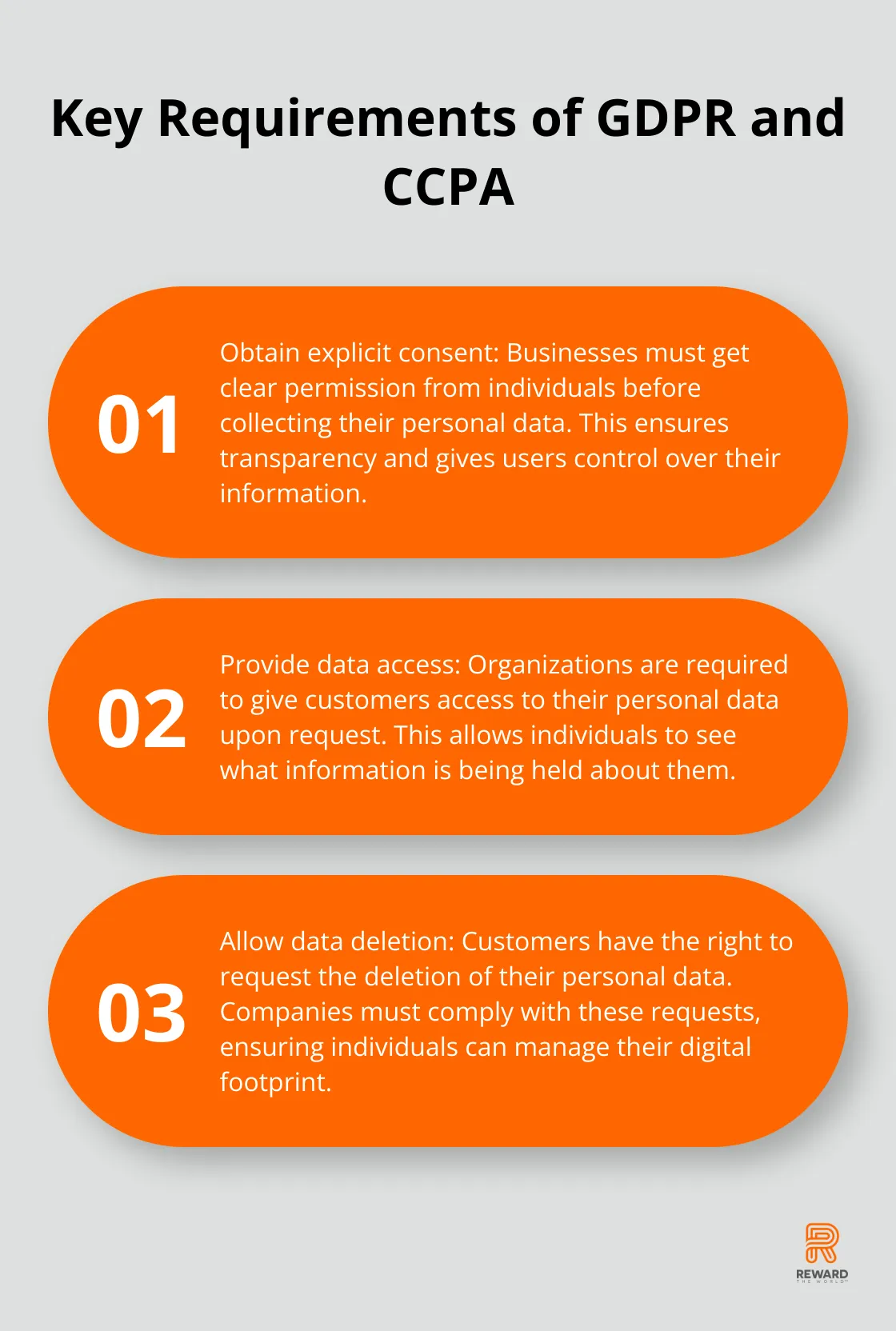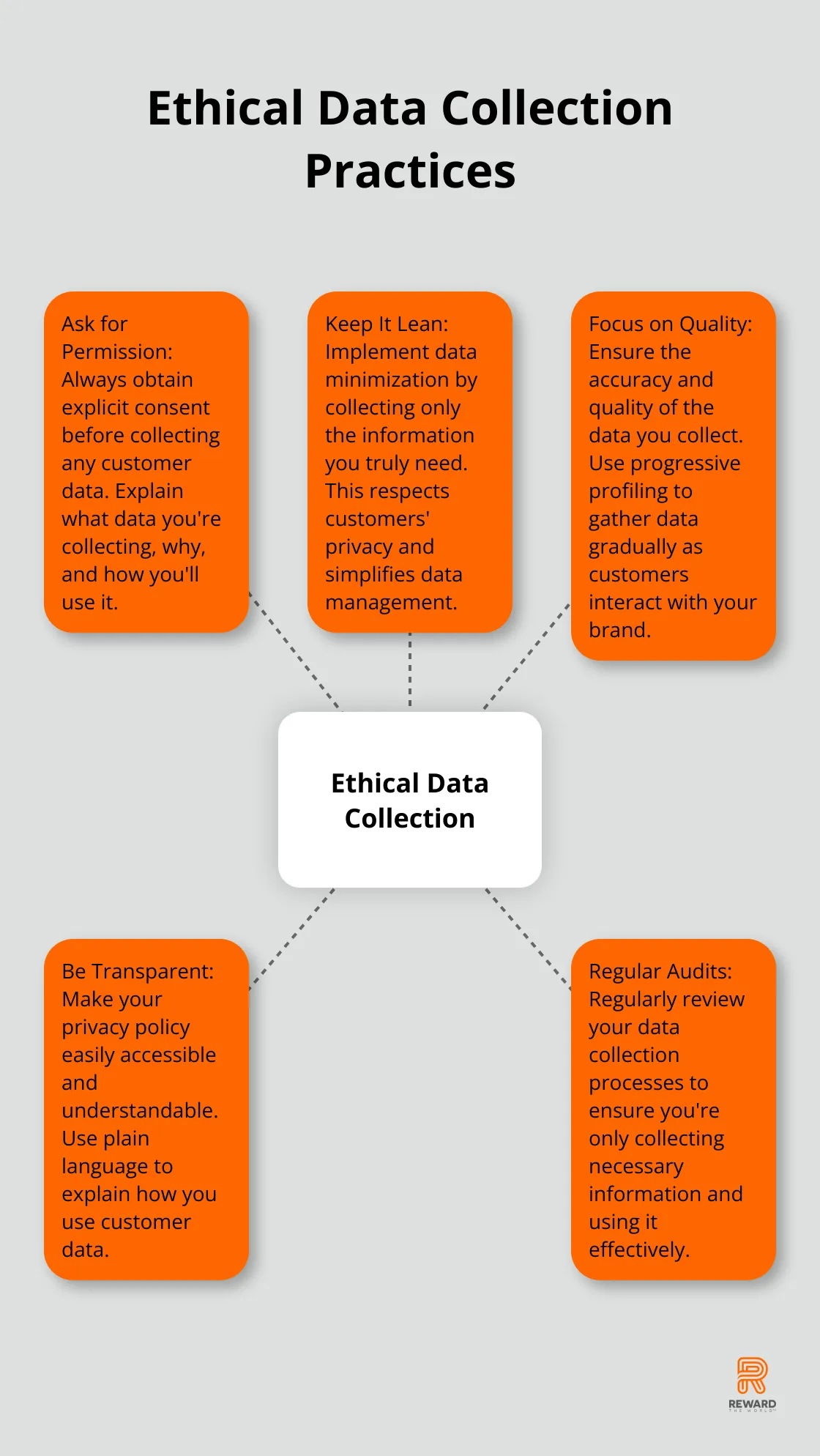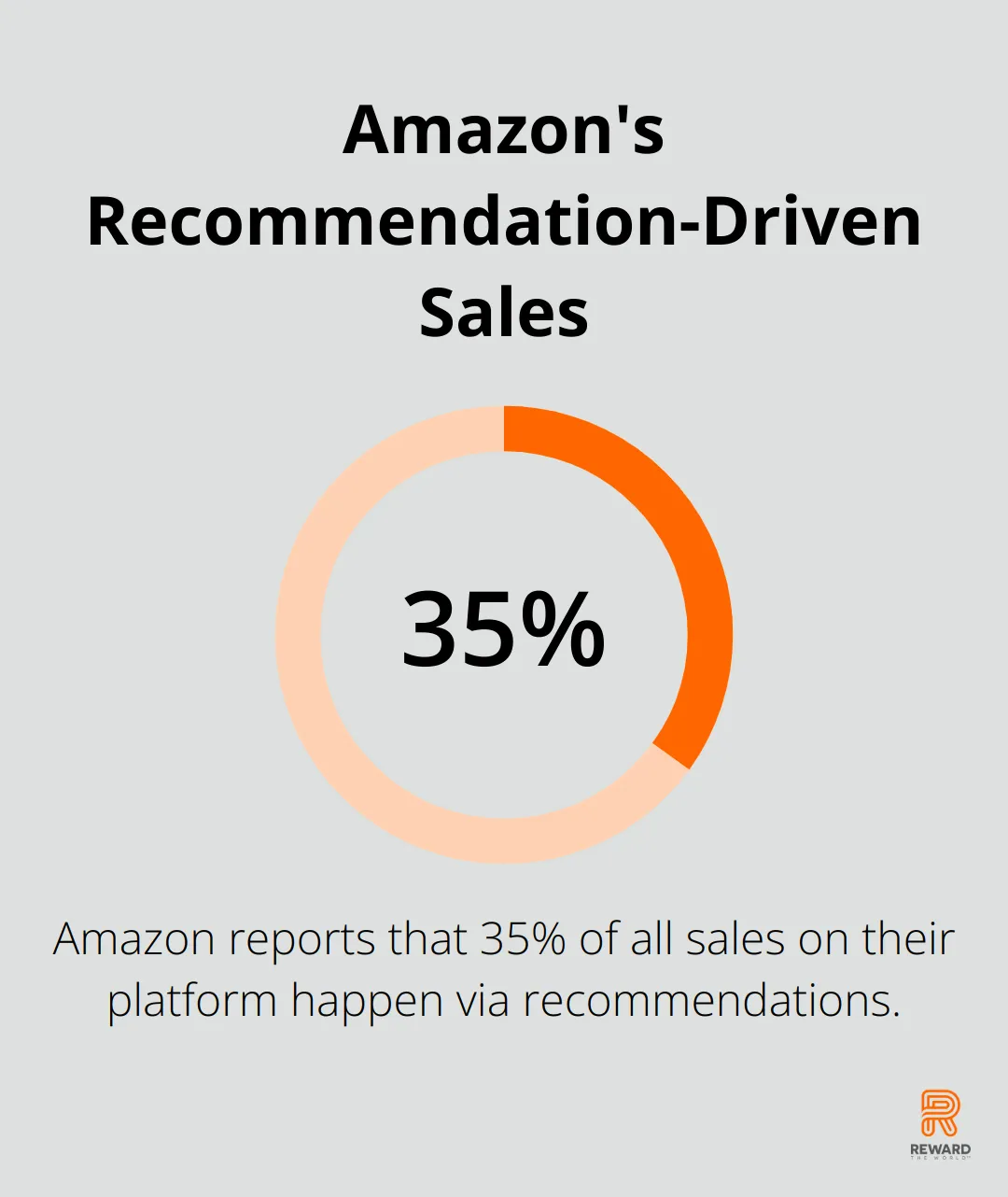
At Reward the World, we understand the power of first-party data in creating personalized experiences for customers. However, with great power comes great responsibility.
In this blog post, we’ll explore how businesses can ethically collect and use customer data to enhance personalization efforts. We’ll cover best practices for data collection, strategies for effective personalization, and the importance of maintaining customer trust throughout the process.
Why Ethical Data Collection Matters
Trust: The Foundation of Customer Relationships
Ethical data collection builds trust between your organization and its clients, users, or research subjects. When individuals feel their data is being handled responsibly, they are more likely to engage with and trust your brand.
Building trust with customers is paramount. This statistic highlights the critical importance of transparent and ethical data practices.
To build trust, businesses must be upfront about their data collection practices. When collecting email addresses for newsletters, companies should clearly state that the information will be used for sending updates and offers. This transparency empowers customers to feel in control of their data, increasing their likelihood of engaging with the brand.
Navigating the Regulatory Landscape
Compliance with data protection regulations extends beyond avoiding fines; it’s about respecting customer rights. The GDPR and CCPA have established new standards for data protection. The California Consumer Privacy Act (CCPA), also known as “the California GDPR” is a state-wide data privacy law that regulates how organizations handle the personal information of California residents.
These regulations require businesses to:

Non-compliance can result in severe penalties. This case underscores the financial risks of non-compliance and the importance of staying current with regulatory requirements.
Striking the Right Balance
Personalization and privacy often appear to conflict, but they don’t have to. The key lies in finding the sweet spot where customers feel their data enhances their experience without feeling invaded.
A practical approach involves progressive profiling. Instead of requesting all information upfront, businesses can gather data gradually as customers interact with their brand. This method respects privacy while still allowing for personalized experiences.
For example, an e-commerce site might initially ask for basic information (name and email). As customers make purchases, the site can then inquire about preferences to tailor future recommendations. This gradual approach feels less intrusive and more valuable to the customer.
The Impact on Business Success
Ethical data collection practices directly influence business success. Companies that prioritize data ethics often see increased customer loyalty, improved brand reputation, and higher engagement rates.
When businesses handle data ethically, customers are more likely to provide accurate information, leading to more effective personalization strategies.
The Role of Technology in Ethical Data Collection
Advancements in technology play a crucial role in facilitating ethical data collection. Customer Data Platforms (CDPs) are the best tools for managing customer data. This software solution brings together data from different tools (like ad platforms) to help businesses centralize and manage customer data securely. These platforms often come with built-in compliance features, making it easier for companies to adhere to data protection regulations.
Additionally, AI and machine learning algorithms can help identify patterns and anomalies in data collection practices, ensuring that businesses stay within ethical boundaries. These technologies can flag potential issues before they become problems, protecting both the company and its customers.
Now that we understand the importance of ethical data collection, let’s explore the best practices that businesses can implement to ensure they’re collecting and using customer data responsibly.
How to Collect Customer Data Ethically
At Reward the World, we know that ethical data collection builds lasting customer relationships. Let’s explore practical ways to collect customer data ethically and effectively.

Ask for Permission
Always obtain explicit consent before collecting any customer data. Explain what data you’re collecting, why, and how you’ll use it. For example, when a customer signs up for your newsletter, use a clear, unchecked box with a statement like: “Yes, I want to receive personalized offers based on my shopping history.”
A recent study by Accenture explored how evolving shopper behavior and AI-powered experiences are redefining brand connection, loyalty, innovation, and growth.
Keep It Lean
Implement data minimization by collecting only the information you truly need. This respects your customers’ privacy and simplifies your data management. For instance, if you run an online bookstore, you probably don’t need to know your customers’ shoe size.
Pro tip: Regularly audit your data collection processes. Ask yourself, “Do we really use this piece of information to improve our service?” If not, stop collecting it.
Focus on Quality
Ensure the accuracy and quality of the data you collect. Inaccurate data can lead to poor decision-making and frustrate customers with irrelevant personalization attempts.
Use progressive profiling to gather data gradually as customers interact with your brand. This approach feels less intrusive and often results in more accurate information.
For example, after a customer makes their first purchase, ask them to rate their experience or share their preferences for future recommendations.
Be Transparent About Data Usage
Make your privacy policy easily accessible and understandable. Avoid legal jargon and use plain language to explain how you use customer data.
Create a simple, visual ‘data usage guide’ on your website. This could include icons representing different types of data and how they’re used to improve the customer experience.
Ethical data collection requires constant attention and adaptation as technology and regulations evolve. These practices not only ensure compliance but also build a foundation of trust with your customers.
Now that we’ve covered how to collect data ethically, let’s explore how to leverage this data for effective personalization in the next chapter.
How to Use Customer Data for Effective Personalization
At Reward the World, we understand the transformative power of effective personalization on customer experiences. This chapter explores practical ways to leverage customer data for personalization that resonates with your audience.
Segment Your Audience for Targeted Campaigns
Divide your customer base into distinct groups based on shared characteristics. This includes demographics, purchase history, or browsing behavior. An online clothing retailer might segment customers by style preference (casual, formal, athletic) and price sensitivity.
Create targeted marketing campaigns using these segments. Mailchimp suggests crafting compelling subject lines, optimizing audience segmentation, and using different channels to boost email open rates. This demonstrates the effectiveness of speaking directly to specific customer groups.
Craft Personalized Product Recommendations
Analyze purchase history and browsing behavior to suggest products your customers will likely love. Amazon reports that about 35% of all sales on their platform happen via recommendations. While you might not match Amazon’s scale, you can still boost sales with smart recommendations.

Highlight organic offerings in a personalized product feed for customers who frequently buy organic products. Feature new arrivals in kids’ categories for those who often shop for children’s items.
Tailor Your Marketing Messages
Customize your marketing communications using customer data. This goes beyond using a customer’s name in an email. Consider factors like past purchases, abandoned carts, and website behavior to create truly relevant messages.
Netflix uses data to drive hyper-personalized customer experiences, employing strategies and technologies that showcase its success in personalization.
Enhance the Overall Customer Experience
Improve every touchpoint in the customer journey using data. This could mean personalizing website content based on a user’s location or previous interactions, or adjusting your customer service approach based on a customer’s history with your brand.
Starbucks’ mobile app exemplifies data-driven experience enhancement. It uses order history and location data to provide personalized offers and convenient ordering options, contributing to the app’s success in driving 17% of the company’s U.S. sales.
Implement Dynamic Pricing Strategies
Use customer data to implement dynamic pricing strategies. This involves adjusting prices based on factors such as demand, customer loyalty, or purchase history. Airlines and hotels frequently use this strategy to maximize revenue.
For example, a loyal customer might receive a special discount on their favorite products, while a first-time buyer might see a promotional offer to encourage their initial purchase. This personalized approach to pricing can increase sales and customer satisfaction.
Final Thoughts
Ethical data collection and responsible personalization form the cornerstone of successful customer relationships in today’s digital landscape. Businesses that prioritize transparency, consent, and data minimization create a foundation of trust with their customers. These practices allow companies to harness the power of first-party data for personalized experiences that truly resonate with their audience.
The future of data-driven customer engagement promises sophisticated personalization techniques, but companies must balance this advancement with an unwavering commitment to ethical data practices. Successful businesses will view data ethics as an opportunity to differentiate themselves and build stronger customer relationships. They will invest in robust data management systems and continuously adapt their practices to meet evolving regulations and customer expectations.
Reward the World understands the importance of ethical data practices in building successful customer engagement strategies. Our global incentives platform helps businesses foster customer loyalty and boost performance while adhering to high standards of data protection and privacy. By leveraging first-party data responsibly, companies can create personalized reward experiences that drive meaningful results.
